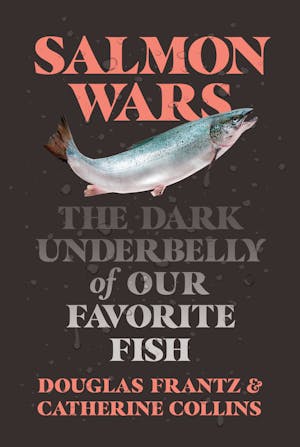Weekend reading: Farmed salmon
Douglas Frantz & Catherine Collins. Salmon Wars: The Dark Underbelly of America’s Favorite Fish. Henry Holt, 2022. (355 pages)

I was asked to do a blurb for this one. Here’s what I said:
Salmon Wars is a deep dive into the damage caused by current fish-farming methods to ocean environments, wild fish and their habitats, and to the farmed fish themselves. It is also a dismal account of the failure of governments to stop such practices. Salmon farming needs reform. Until it does, read this book, and you will never eat farmed salmon again.
As for what to do about the hazards of salmon farming—lice, pollution, reduction of wild salmon, escape from pens, requirement for feeder fish and the depletion of those stocks, the authors have three suggestions:
(1) Know the risks and rewards of eating farmed salmon and insist on more transparency.
(2) Take responsibility for insisting on better ways of raising farmed salmon.
And (3)
The third step is for governments to stop putting a thumb on the scale when weighing economic interests versus the public wellbeing. Governments should take responsibility for protecting the environment and public health. They should adopt strict curbs on the use of chemicals by salmon farmers. They should require notification of all relevant authorities of every escape or suspected escape, and those reports should be made public. Food labels should be thorough, accurate, and reflect how the salmon was raised…There must be similar global efforts to protect the public health and the welfare of salmon.
This is a hard-hitting book and, as you might expect, it’s gotten some pushback.
Saving Seafood, a group that “conducts media and public relations outreach on behalf of the seafood industry,” says “New ‘Salmon Wars’ Book Is Full of Fictions. Here Are the Facts.” Here are a couple of examples:
FICTION: Farmed salmon are crammed into cages.
FACT: Salmon occupy less than 4 percent of a typical marine cage. Farmers intentionally keep stocking densities low so fish have room to swim, grow, and mimic natural schooling patterns.
Farmers take great care to ensure the well-being of their salmon. Fish are vaccinated against several diseases, and pristine marine cage conditions are ensured with proper siting, regular fallowing (leaving sites unused), underwater cameras, and diver inspections.
FICTION: Farmed salmon are doused with pesticides and antibiotics.
FACT: Antibiotic use on salmon farms is far lower than that of any other agricultural animal producing industry in the world. In the rare instances when treatment is necessary, it is prescribed and overseen by licensed veterinarians under the oversight of government regulators.
In 2012 I visited a salmon farm above the Arctic Circle in Norway’s and wrote a post about it.
That one looked pretty good. Now? Others? Who knows?
My recommendation: Visit one if you can. Short of that, read this book. Than decide what you think are the facts.

